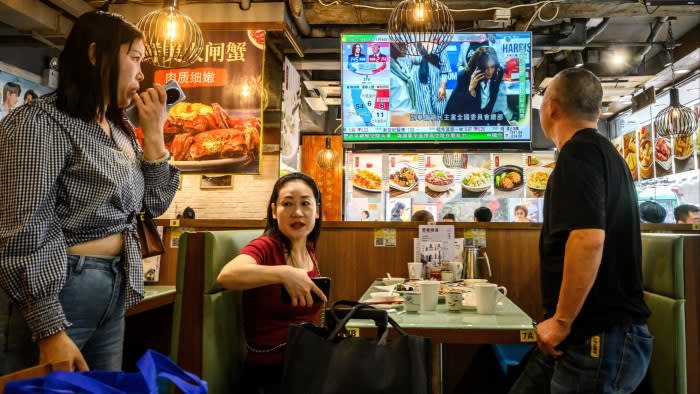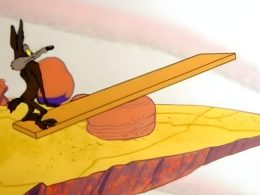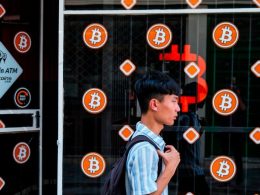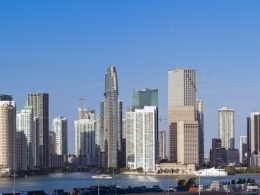Asia is bracing for Donald Trump’s return to the White House, after he threatened on the campaign trail to inflict sweeping tariffs on China and questioned Washington’s security commitments to Taiwan and US allies South Korea and Japan.
The Republican former president has proposed blanket tariffs of more than 60 per cent on all Chinese imports and ending the country’s most favoured nation trading status, moves that would hit China’s faltering economy and send shockwaves through global supply chains.
Trump’s first term in office sparked an unprecedented US-China trade war, spurring a rush to shift supply chains to south-east Asia, India and other parts of the region. His unorthodox approach to regional security also raised concerns among US allies in Asia over Washington’s defence guarantees, leading to a sharp increase in arms spending.
If Trump implemented the toughest measures against China touted by his supporters including former US trade representative Robert Lighthizer, “that would create a very hard time for US-China trade relations and the entire relationship”, said Ma Wei, associate researcher at the Chinese Academy of Social Sciences, a government think-tank in Beijing.
Citi analysts estimated that in an extreme scenario, in which Beijing was unable to divert some of its trade to the US through other countries, Trump’s 60 per cent tariff would knock 2.4 percentage points off Chinese GDP growth.
Chinese officials were tight-lipped on Wednesday, with a foreign ministry spokesperson saying China “respect[s] the choice of the American people”.
Alicia García-Herrero, chief Asia-Pacific economist at Natixis, predicted that after an initial round of tit-for-tat tariffs, Trump and Xi would probably negotiate a new trade deal. But other economies would be “squeezed” by Trump’s refusal to allow US-China trade flows to be rerouted through other countries such as Mexico and Vietnam.
Japanese automaker Honda has warned that Trump’s threat to introduce sweeping tariffs that could be in excess of 100 per cent on cars imported from Mexico could have an “extremely big impact” on its operations.
Shinji Aoyama, Honda’s executive vice-president, told a press conference in Tokyo on Wednesday that lasting tariffs, if introduced, could force the carmaker to “consider moving production elsewhere . . . such as domestically in the US or somewhere else”.
Japanese policymakers had been preparing for a Trump presidency for two years, said government officials. During Trump’s previous term, the late Japanese prime minister Shinzo Abe established a strong personal relationship with the president. But this time, a recent general election has left Japan with a weakened ruling coalition under Shigeru Ishiba.
“The concern in Tokyo is that Trump will accelerate the move away from a more US-led world,” said Stephen Nagy, professor of politics and international studies at the International Christian University in Tokyo.
Trump had accused allies such as Japan and Korea of “freeriding” on US military strength in Asia and boasted of forcing them to contribute more to the cost of hosting US forces on their soil, an issue that strained relations at the time.
“Trump will clearly demand renegotiations,” said Kim Jae-chun, a professor at Sogang University and former government adviser.
The risks of a more transactional US foreign policy are even higher for Taiwan, which relies on Washington’s support to deter Chinese aggression.
Trump has also called for Taipei to pay Washington for defence, claiming the US was “no different than an insurance company” and complaining that Taiwan “doesn’t give us anything”.
He has also accused Taiwanese companies of “stealing” the US chip industry and suggested TSMC, the world’s largest semiconductor manufacturer, which received billions of dollars in subsidies for big investments in the US, go “back to their country”.
But most Taiwanese government officials believe bipartisan consensus in Washington against Beijing points to continued support for Taipei.
“We believe that the US will continue its current approach of constraining China and being friendly to Taiwan,” Tsai Ming-yen, director-general of Taiwan’s National Security Bureau, told parliament on Wednesday.
For south-east Asia, the reshoring of manufacturing from China during the first Trump administration could now make emerging US trade partners a target.
“There may be more focus on trade imbalances with south-east Asia, with Vietnam’s very large trade surplus with the US an obvious target,” said Peter Mumford, south-east Asia head for Eurasia Group.
At an annual international trade expo in Shanghai, which coincided with the US election, premier Li Qiang sought to defend international trade, warning that “protectionism” was “on the rise”.
One attendee, who gave her surname as Wu, said Trump “wants to choke us”. “Maybe it’s because he’s afraid our China will overtake America,” she added. “It’s always tariffs, tariffs, tariffs.”
Reporting by Joe Leahy in Beijing, Leo Lewis and Harry Dempsey in Tokyo, Edward White and Thomas Hale in Shanghai, Kathrin Hille in Manila, Kana Inagaki in London, A. Anantha Lakshmi in Jakarta and Song Jung-a in Seoul
Source link









